Regulatory
Used antifreeze is not listed as a hazardous waste by either the U.S. Environmental Protection Agency (EPA) or the Missouri Department of Natural Resources (MDNR). Although ethylene glycol, the main ingredient in most automotive antifreeze, is poisonous if ingested, in the environment it will eventually biodegrade into carbon and water. Thus, unused antifreeze presumably does not pose a serious long-term threat to water quality. However, used antifreeze often becomes contaminated through use. Some used antifreeze may have contaminants such as lead, benzene and other hazardous parameters, which make it a hazardous waste. These contaminants can contribute to water pollution.
Used antifreeze must be managed in a way that does not adversely affect human health or environment or create a public nuisance. Do not dispose of antifreeze in septic systems, down storm drains, in streams or on the ground.
A responsible way to manage used antifreeze is through a community collection program. Although currently there are no state or federal regulations governing the collection of used antifreeze, it is important to check local regulations and keep up to date on regulatory changes that may affect the operation of your collection program.
Technical
Site
The site for an antifreeze collection center could be city- or county-owned facilities, fire stations, landfills, recycling centers or even privately owned businesses. It is recommended that the owner/operator of the site provide security and control over the collection tank at all times. Staff should be present to receive the antifreeze during open hours. The site should be locked after hours to prevent dumping of unwanted materials. A prominent sign near the tank should inform users that only antifreeze may be deposited. Many communities provide joint collection sites for used motor oil and used antifreeze.
Equipment
Antifreeze disposal companies that serve Missouri will pick up used antifreeze stored in 55-gallon drums. These companies will also retrieve antifreeze from larger storage tanks. The ideal design for a community-used antifreeze collection program is a large, double-walled tank (150 to 275 gallons), with a screened and covered drainage area, surrounded by an impervious containment area in case of spillage. (See sample designs.) Some companies provide large storage tanks for a one-time or yearly rental fee.
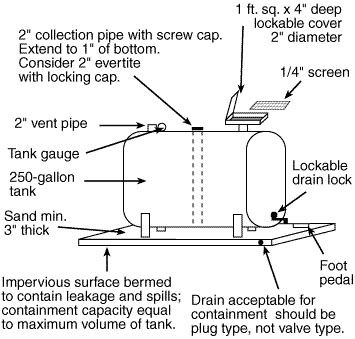 Design 1
Design 1
Sample antifreeze collection tank design.
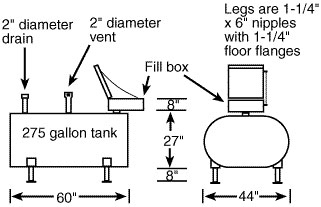 Design 2a
Design 2a
Typical antifreeze tank dimensions.
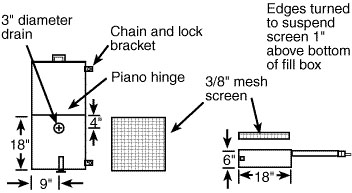 Design 2b
Design 2b
Concrete containment area.
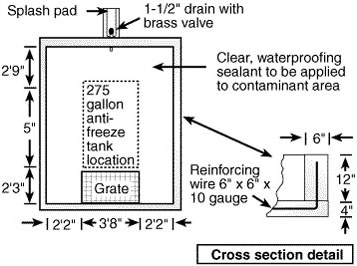 Design 2c
Design 2c
Fill box detail.
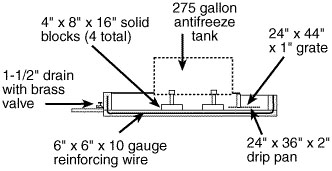 Design 2d
Design 2d
Side view.
Non-biodegradable absorbents, such as cat-box filler or a commercial product, should be kept on hand for cleaning up minor spills. Personal protection equipment should be provided for staff, including protective clothing, nitrile gloves and chemical splash goggles.
Recommended procedures
- Used antifreeze is brought to the collection facility. You may wish to limit the quantity accepted from each householder. Householders bringing in the antifreeze are asked to sign in, recording their name, the amount deposited, their address and signature in a log book.
- Householders are asked if the antifreeze has been mixed with any other substance. Staff visually inspects the antifreeze to see if it has been mixed with any other material.
- Staff drains antifreeze through wire mesh into tank. Each staff member handling antifreeze should take precautions against skin and eye contact by wearing nitrile gloves, chemical splash goggles and other protective clothing.
- Staff locks or secures the tank to prevent dumping when the tank is not supervised.
- Clean up spills using a non-biodegradable absorbent.
- Check tanks periodically for leaks.
Management
Choosing a company
Because a collection program could be liable for any collected used antifreeze that is subsequently disposed of improperly, you must ensure that it is picked up by a responsible transporter and delivered to a reputable management facility. Some licensed used oil transporters will also pick up used antifreeze. Find out from the transporter where the used antifreeze will be delivered. Check with the receiving facility to make sure it can accept spent antifreeze and discuss how the facility manages antifreeze. Give preference to companies that recycle antifreeze rather than dispose of it. Some transporters and/or management companies offering antifreeze services may require the collection center to manage used antifreeze as hazardous, unless the collection center can prove that it is not.
To determine if the company operates in a safe and environmentally sound fashion, you may want to check with the following sources:
- Nearby municipalities and local businesses that may have used specific disposal companies in the past;
- Trade associations that may keep a file on companies that handle automotive wastes;
- The Chamber of Commerce or Better Business Bureau to find out if any complaints have been registered against a company or facility; and
- The Missouri DNR, which may know whether the company has had any compliance problems.
Checking sources and choosing a company can be time-consuming. Begin your research well ahead of the time you need to transport the waste. Careful selection is essential to minimizing liability.
Fate of used antifreeze
In general, used antifreeze consists of water, ethylene glycol, small amounts of other glycols (di- and triethylene) and depleted inhibitors. Inhibitors are substances used to retard undesirable actions, such as foaming or rusting. Used antifreeze also may contain heavy metals picked up from the engine, such as lead, iron, copper and zinc and other hazardous chemicals, including benzene (an additive in gasoline) and perchloroethylene (used to flush out radiators).
Used antifreeze may be recycled or reconstituted. Reconstituted antifreeze is filtrated to remove the insoluble contaminants. Ethylene glycol is then added to restore the original freeze-protection level, and additional inhibitors are added as needed to meet manufacturer specifications. The filters used to reconstitute antifreeze typically are disposed of in the solid waste stream. Businesses generating large quantities of used antifreeze often reconstitute it on-site and reuse it in their vehicles.
Recycling used antifreeze distills the solution, separating most of the water and impurities from the ethylene glycol. Supplemental coolant may then be added to the extracted ethylene glycol to produce new antifreeze. Or, the ethylene glycol extraction may be sold to industrial businesses for use as an ingredient in manufacturing. The residues are blended with other materials and used as supplementary fuels in cement kilns.
Propylene glycol
Recently, a new antifreeze was introduced on the market. Instead of using the highly toxic ethylene glycol, this antifreeze contains propylene glycol, which has a much lower toxicity rating. Propylene glycol has similar physical properties but lacks the sweet taste of ethylene glycol, making it less attractive to children and animals.
However, used propylene glycol-based antifreeze may contain the same heavy metals and other contaminants as ethylene glycol-based antifreeze. Therefore, it should be collected and managed in the same manner as the ethylene glycol product. While most processing methods can handle propylene glycol-based antifreeze in much the same way they handle ethylene glycol-based antifreeze, the two should not be mixed. If mixed together in a collection tank, the entire contents of the tank could be rendered unrecyclable. Therefore, if consumer use of propylene glycol-based antifreeze rises, two separate collection tanks will be needed at the collection site. Check with your transporter or management company for specific handling procedures.
Contacts and resources
State contact
Missouri Department of Natural Resources, P.O. Box 176, Jefferson City, Mo. 65102
Hazardous Waste Program: 573-751-3176
Technical Assistance Program: 573-526-6627
The used antifreeze management and equipment companies listed below may have a regional office in your area. Check your local telephone directory for listings. This list is not necessarily a complete list of available services. HHWP does not endorse specific companies nor certify that the companies are in compliance with applicable laws.
Used antifreeze management companies serving Missouri
- EnviroPur, Inc., 7601 W. 47th St., McCook, Ill. 60525
708-442-6000 - Industrial Services Corp., P.O. Box 266219, Kansas City, Mo. 64126
816-833-1919 or 800-821-4302 - Safety Kleen, 734 N.W. Bypass, Springfield, Mo. 65802
417-869-1179 - Southwest Oil, 580 S. 260th St., Pittsburg, Kan. 66762
800-554-9271
Used antifreeze recycling equipment suppliers
- BG Products, 701 S. Wichita, Wichita, Kan. 67213
316-265-2686 - ECP, Inc., One Westbrook Corp. Center. Suite 1000, Westchester, Ill. 60154
800-323-3521 - EcoSystems, Inc., P.O. Box 1893, Thomasville, Ga. 31799
912-228-6888 - SPX-Prestone, Robinair Division, SPX Corp., Robinair Way, Montpelier, Ohio 43543
419-485-5561